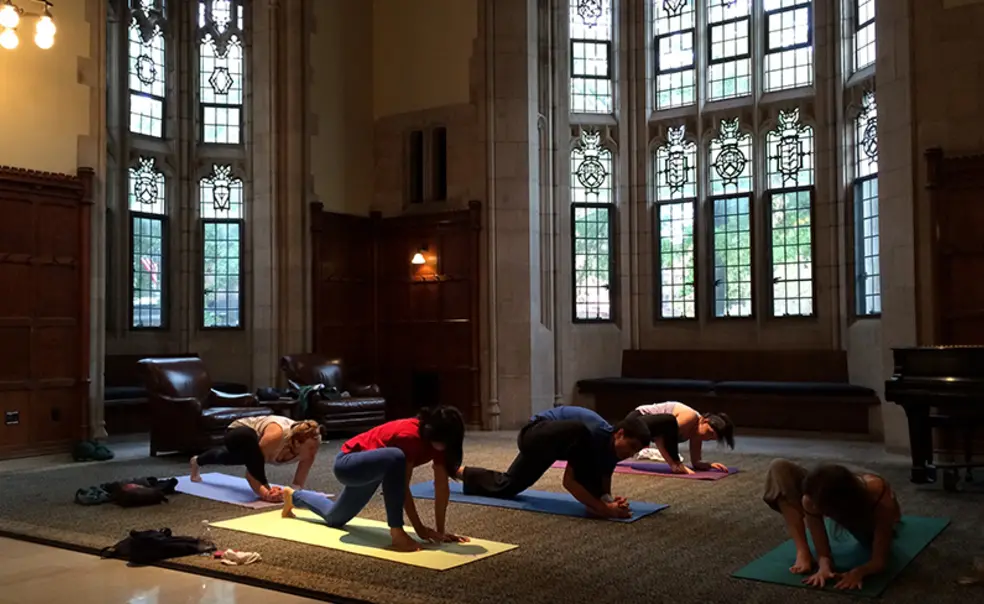The Whole Student: Mindfulness Techniques for Even the Most Type-A Among Us
Piper, the fictional UNC student who took her Duke-identified family to Thailand on The White Lotus, dramatically decided that no, the simple life was not for her. But real college students should not reject spending time in reflection so quickly. None of us should.
Because I work with some of the most hard-driving college students — athletes, pre-meds, and sometimes athletes who are pre-med — I am always in search of effective strategies for synchronizing mind and body. The pursuit of excellence will never be stress-free. Yet, more resilience, calm, and mindfulness are attainable — even for the most type-A among us — with intentional practice.
Whether I am working with an elite tennis player struggling with negative self-talk during changeovers, or an applicant to medical school who is nervous about interviews, I draw frequently from a protocol in which I was trained by the MSPE Institute, called Mindful Sport Performance Enhancement (MSPE). I learned MSPE to guide athletes and coaches through a system of practices that integrate mindfulness into their training and daily lives. More generally in my advising practice, I have been impressed by the way the principles of MSPE have helped a wide range of high performers. Here are a few tips from the framework, for PAW readers seeking to optimize any type of performance and/or enhance your mental health:
Focus on the breath. You can begin a mindfulness journey by bringing attention to your breathing. Not changing it, not judging it. Just allowing it to slow down while you pay attention to the in and out flow. You can take a few moments in the morning or before bed. Try sitting comfortably and taking a few deep, slow breaths, imagining you could track the inhale from the tips of your toes up through your whole body, then feeling a sense of letting go throughout the whole body during the exhale. Even a small dose of attentive, intentional breathing is a great way to prepare for or wind down from a hard day.
Acknowledge obstacles and pay attention to physical self. The full protocol directly explores the reasons people can find mindfulness practice challenging — lack of time, boredom, etc. The practice known as the “body scan” can both elicit and push back on these challenges. You can take a few moments to be curious about your resistance, and then tune into your body from the feet all the way up, noticing what your muscles are holding. While the goal is not always to relax, it is always true that you can’t let go of tension you’re not aware of.
Stretch the body’s limits. From a brief, intentional seated or standing stretch to a full-hearted hour of yoga, there are campus recreation options galore, and a gamut of namaste in most towns. To find yoga in your area, try here. A mindful stretch can introduce you to some calm in discomfort.
Be mindful in motion. Having stretched, you might consider walking with awareness of your feet on the ground, noticing thoughts without attaching to them. Turning an activity that you often do mindlessly into one you do with intention can restore inner calm and agency. Research suggests we spend about half our time with a wandering mind. Intention and curiosity can create more choices.
Integrate mindfulness IRL (in real life). It’s one thing to hone inner peace during down-time, and another when the stakes feel high. Becoming more attuned to breath and body and adopting compassionate self-talk can lead to the freedom to perform at one’s highest level when it counts most. Paradoxically, you can become the best version of yourself when you anchor in the present with the least amount of striving.
Allow yourself to be a work in progress. One of MSPE’s most valuable lessons is that becoming a mindful human is a process that is never complete. It doesn’t end with graduation, and you won’t receive a piece of paper that tells you the work is done. Instead, you can revisit the concepts over and over again. Each time you may find more space to breathe.
Practicing mindfulness is not a panacea, and it won’t remove the genuine stressors that exist on our campuses and in our communities. However, by incorporating basic mindfulness practices into hectic, high pressure, demanding routines, you can build up the power to manage moments with more grace, more skill, and better health. And if you’ve been so busy that you haven’t taken a vicarious vacation to The White Lotus yet, I highly recommend the occasional guilty pleasure, in whatever form works best for you.












No responses yet